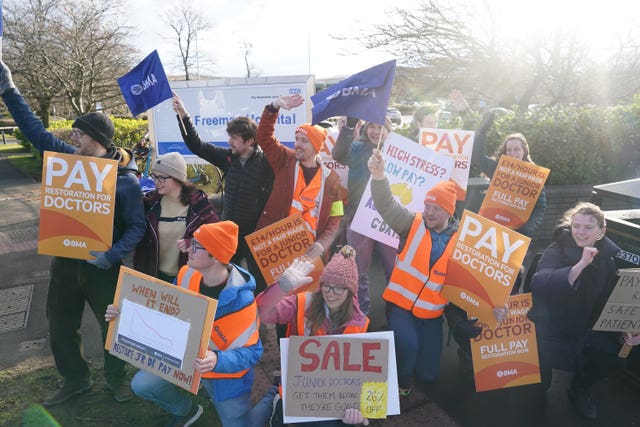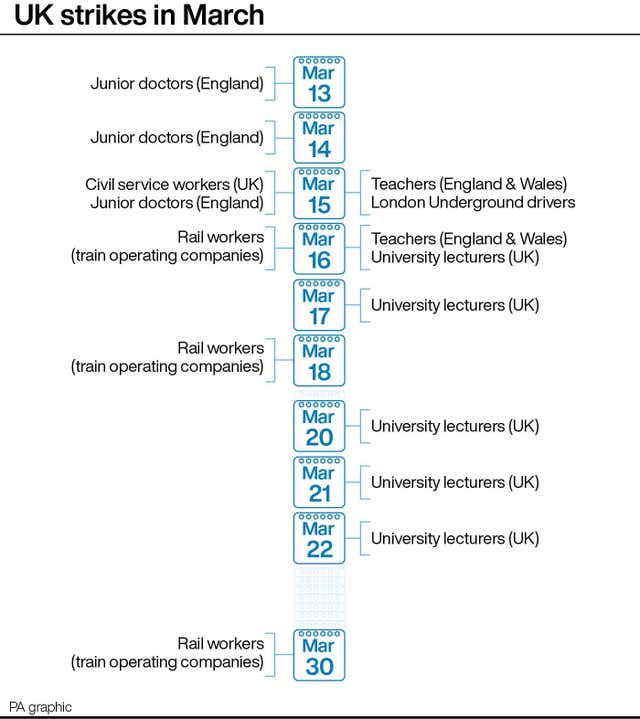
Clive Bull 1am - 4am
13 March 2023, 22:24

Medics have described struggling to cover basic household expenses.
Junior doctors on picket lines have said they have to work extra shifts just to to pay energy bills and told of their concerns for paying for basic home repairs.
One medic said the public would not want to be treated by a doctor who was “worrying about how they’re going to pay their bills”.
Others expressed frustration over the claim that baristas earn more money than the entry-level salary for junior medics.
“Junior doctors are the people who are there when your babies are born, the people who are there when your heart stops if you need resuscitation,” one said.
Speaking outside the Queen Elizabeth Hospital in Birmingham, junior doctor Shivam Sharma told the PA news agency: “Junior doctors have faced a massive 26% real-terms pay cut over the last 15 years. We are not worth 26% less, we don’t do 26% less work, we don’t see 26% less patients. In fact, the work has only gotten harder.
“Currently, 50% of junior doctors are struggling to pay rent, mortgage and bills, and 50% are having to borrow money from friends and family just to make ends meet.
“If you or I were going into hospital critically unwell, we couldn’t want our junior doctor to be worrying about how they’re going to pay their bills.
“So something has to be done – we have to value doctors here if we are going to keep them.”
Paul Smith, a first-year surgical trainee at the Nottingham University Hospitals NHS Trust, said: “I started in my training post in August last year and I’ve spent £3,000 on course fees, professional fees and exams. We can claim some tax back but I’ve still got to pay that upfront.
“Me and my partner managed to save up enough money to buy a house locally and we found a hole in the roof last week.
“We’re genuinely struggling to find the money to fix that at the moment.”
Hamish Bain, 29, a neurology trainee working at University College London Hospitals, told PA poor pay has forced him to continue living with his parents.
“I live at home, after spending 11 years studying and training. I love my parents but this isn’t something that I would choose to do if I had the money,” he said.
Meanwhile Sumi Manirajan, 29, who works at a hospital in north-west London, said she had been forced to borrow money from her parents in order to sit her medical exams.
Rebecca Lissman, 29, a trainee in obstetrics and gynaecology, said that “all that junior doctors are asking is to be paid a wage that matches our skill set”.

Speaking from the picket line at University College Hospital, on Euston Road in London, she told the PA news agency: “I still want to work for a service that’s free at the point of use when I’m a fully qualified consultant. We want a health service that works for everyone and that’s why I’m here today.
“In my field, we are working in surgery but we are also supporting people on the hardest days of our lives. Around a third of people drop out before they finish their training because it is so taxing.
“We can’t give people the service they deserve and see them as quickly as they need because we are so stretched.
“I want to be in work, looking after people, getting trained. I don’t want to be out here striking but I feel that I have to.”
Edward Finn, an anaesthetist registrar at the Nottingham University Hospitals NHS Trust, said: “If you look at the overall cost of living, wages that haven’t kept up with that, and we don’t go out for meals, we don’t do anything.
“My wife and I are both part-time – we couldn’t afford to be full-time with the cost of childcare – but we still have to do the occasional extra shift on top of our contracted hours to keep up with things like the electricity bill.
“When you’re talking about somebody who’s been a doctor for 12 years, it’s quite sad really, isn’t it?”

Striking junior doctor Martin Whyte, on the picket line in Newcastle, said the public understood the need for the industrial action.
The paediatric registrar worked night shifts at the Royal Victoria Infirmary this weekend where the average wait for A&E was six hours.
He said: “We used to say anything above four hours was a breach but we have missed that target so overwhelmingly now, it’s almost not worth counting.
“These systems are failing chronically and I think the public understand that.
“They know steps have to be taken to address that, and that starts with better retention of staff and for that you need better pay. We are seeing a lot of attrition from the workforce.”
The 36-year-old said newly qualified doctors used to talk about the specialism they hoped to work in, adding: “Now when I talk to them they say ‘I’m going to go to Australia’, ‘I’m going to go to Canada’, or ‘I’m going to quit medicine all together’, because the pay relative to the work and the intensity and the hours just doesn’t add up.”
Speaking on a picket line at Leeds General Infirmary, Dr Chris Morris, doctor and British Medical Association rep, said: “It’s really reassuring when members of the public do go past honking their horns, giving us messages of support. It reemphasises why we’re doing this.”
“I don’t think anyone has taken this decision lightly. It’s the last thing we want to do as doctors but we feel that we’ve pushed into this decision by the Government.”
A junior doctor participating in the strike in Bristol said the “support from the public” meant she felt “at the end of the day like I have done the right thing”.
Dr Emma Coombe, 34 from Nailsea, Somerset, a junior doctor training to be a consultant paediatrician and a BMA rep, graduated from medical school in 2011 and is 18 months away from qualifying as a consultant.
She told the PA news agency: “Today was hard work. I was involved in setting up the picket outside our hospital and I didn’t really sleep well last night because I was just so anxious about how it was going to go.
“It was rewarding because we had so much support from the public – we had people honking their horns, we had members of the public coming up and telling us that they support us, we had donations of food and drink from the local cafes.
“It was really heartwarming. It was wet, it was cold, it was very windy, I am tired through to my bones, but I have got a feeling at the end of the day like I have done the right thing.”